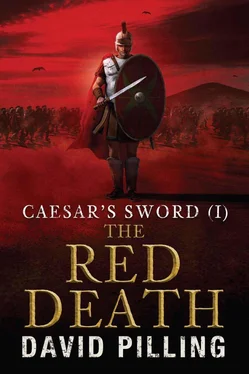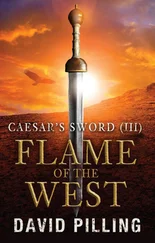David Pilling - The Red Death
Здесь есть возможность читать онлайн «David Pilling - The Red Death» весь текст электронной книги совершенно бесплатно (целиком полную версию без сокращений). В некоторых случаях можно слушать аудио, скачать через торрент в формате fb2 и присутствует краткое содержание. Год выпуска: 2013, Жанр: Исторические приключения, на английском языке. Описание произведения, (предисловие) а так же отзывы посетителей доступны на портале библиотеки ЛибКат.
- Название:The Red Death
- Автор:
- Жанр:
- Год:2013
- ISBN:нет данных
- Рейтинг книги:4 / 5. Голосов: 1
-
Избранное:Добавить в избранное
- Отзывы:
-
Ваша оценка:
- 80
- 1
- 2
- 3
- 4
- 5
The Red Death: краткое содержание, описание и аннотация
Предлагаем к чтению аннотацию, описание, краткое содержание или предисловие (зависит от того, что написал сам автор книги «The Red Death»). Если вы не нашли необходимую информацию о книге — напишите в комментариях, мы постараемся отыскать её.
The Red Death — читать онлайн бесплатно полную книгу (весь текст) целиком
Ниже представлен текст книги, разбитый по страницам. Система сохранения места последней прочитанной страницы, позволяет с удобством читать онлайн бесплатно книгу «The Red Death», без необходимости каждый раз заново искать на чём Вы остановились. Поставьте закладку, и сможете в любой момент перейти на страницу, на которой закончили чтение.
Интервал:
Закладка:
Theodora was dressed in a manner calculated to draw some of the attention away from the returning heroes of Empire. She wore a tall silver crown with strings of pearls hanging to her breast, and carried a broad jewelled collar on her shoulders. The hem of her purple robes were decorated with images of the Magi bringing gifts to the Christ Child, and her white tunic underneath was bordered with bright colours of gold, red and green. She looked more like an imperial statue than a living person, and formed a shining contrast to her dumpy husband and the drab, almost apologetic figure of Belisarius.
Further proof of the Emperor’s trust in his victorious general was soon forthcoming. He ordered gold medals to be struck, stamped with an image of himself on one side and Belisarius in full armour on the other. The pick of Belisarius’s Veterans and personal guards, including myself, were allowed to wear these medals tied to ribbons slung around our necks during the triumphal march.
The triumph itself took place several weeks after the return of the fleet. It was the most splendid event I have ever witnessed or participated in, a dying echo of the glory of Ancient Rome.
Belisarius marched on foot from the door of his villa, along the Mese towards the Hippodrome. The road was lined with exulting citizens, held back by lines of Excubitors in ceremonial uniform. I was one of a thousand guardsmen that marched in step behind the procession of Vandal prisoners and wagons piled high with Vandal treasure. There were also captured chariots and carriages made of pure gold, pulled by teams of horses. Pride of place was given to the Menorah and other items of sacred Jewish worship, taken by Genseric from the Church of Peace in Rome, and now restored to Rome’s heirs.
How the Romans cheered for Belisarius, how they screamed and roared his name! Women and children threw bouquets of flowers at his feet as he strode down the Mese, priests loaded him down with blessings, and choirs of schoolboys and white-robed maidens sang his praises. He made for a brave figure, his armour painted gold for the occasion and sparkling in the brisk sunshine, his helmet with its stiff purple plume tucked underarm.
Behind him was Gelimer. The Vandal king was clothed in purple, as was his nephew Euages. They walked at the head of the long line of Vandal captives. His brief conversation with Belisarius at Carthage had clearly made a deep impression on Gelimer, for as he walked he shrieked repeatedly:
“Vanity of vanities, all is vanity!”
As he had feared, the Romans jeered and pelted him with insults and refuse. It mattered little, for his wits were gone. He leaned heavily on Euages as he walked, and several times stumbled and almost fell flat on his face.
The pride and respect of the decimated Vandal royal line was invested entirely in his young nephew. I pitied the boy, who did his best to look unafraid, and hoped he would not be condemned to a life of gentle captivity.
The procession moved on to the Hippodrome, filled with crowds for the first time since the Emperor had closed it down after the Nika riots. Justinian and his consort sat enthroned on a wooden platform in the middle of the arena, surrounded by an honour guard.
The cheers of the citizens rose to a deafening storm as Belisarius marched into the arena. At the foot of the platform he halted, saluted the Emperor and went down on one knee, bowing his head in a gesture of submission.
As we had been instructed, I and another guardsman seized Gelimer by his arms and marched him towards the dais. He looked at us in dazed confusion, but I thought I glimpsed a spark of recognition in his bloodshot eyes when he beheld me.
“I am not your footstool now, Majesty,” I whispered, unable to resist the jibe. Gelimer’s mouth flapped open and shut a couple of times, but no sound came out. Fortunately, my comrade did not hear me.
We brought Gelimer to a halt beside the kneeling figure of Belisarius, and tore away the purple garment he wore, leaving him in his underclothes. To renewed cheers, we forced him down until he was on his knees and his forehead was pressed against the ground.
“Behold, Caesar,” we chorused, stamping our feet and raising our arms to salute the Emperor, “your general and your enemy both kneel before you.”
Justinian signalled at the two men to rise. I risked a glance at Theodora, and was unnerved to see her glaring at me with a mirthless grin pasted to her heavily made-up features. She had not forgotten me. That malicious woman never forgot a slight, no matter how small, or ceased plotting how to avenge it.
The triumph was not the end of the honours heaped on Belisarius, for the Emperor named him as Consul for the following year. This office, once the highest and most powerful in the Roman state but long fallen into disuse, still had a ring of power and glory to it. No higher rank could be conferred on Belisarius save the imperial crown. It may be that Justinian still entertained some slight suspicion of the general’s ambitions, and sought to divert them with this lesser dignity.
As for Gelimer, the Emperor held to his promise of clemency and gave him a considerable and well-guarded estate in Galatia to live out his days on. I never saw him again after the triumph, though I occasionally heard stories of a harmless madman walking the gardens and orchards of his gentle prison, babbling in Latin and weeping over his lost kingdom.
His brave nephew Euages requested and was allowed to join the Vandal soldiers captured in North Africa and brought to Constantinople. These were divided into mercenary squadrons and sent to the eastern frontiers of the Empire, to serve as auxiliaries against the threat of Sassanid Persia. Thus the Emperor skilfully turned his enemies against each other.
I did not see Belisarius’s second triumph, held to mark his consulship, when he was carried on a chair on the shoulders of captured Vandals and showered the adoring crowds with gold and silver pennies.
The triumph was held during the January of 535 AD, by which time I was languishing in prison with a charge of treason hanging over my head.
Chapter 26
From the moment I stepped off the boat in Constantinople, I had been wary of danger lurking around every corner. My enemies were powerful, and could have my life snuffed out like a candle. I am convinced that only the favour of Belisarius protected me during the weeks leading up to his first triumph.
I recalled the fate of my childhood friend, Felix, done to death in an alleyway by Theodora’s lackeys, and took steps to guard myself. Belisarius’s personal guards were quartered near his private chambers in the Great Palace, where I felt safe from the knives of hired assassins. I rarely ventured out alone, especially at night, and wore my armour during all waking hours, even when off-duty. Some of my comrades thought this a great joke. Others knew that Belisarius favoured me, and made wry comments about the fate of poor soldiers who meddled in politics.
“A word of advice,” one officer confided to me over supper. “Apply for a transfer to one of the garrisons along the Danube, and get out of the city. It’s cold there, and you will have to suffer the company of Thracians, but a little discomfort and boredom is better than ending up dead.”
“I’ll not leave,” I replied through a mouthful of bread, “the city is my home, and I have no desire to freeze on some isolated border outpost. At any rate, the Danube is not far enough to escape my enemies. I would have to quit the Empire.”
The officer shrugged and said I was a fool. He was right. I should have fled Constantinople when I had the chance. My experiences in North Africa had led me to believe I could weather any storm, and I reckoned without the arrogance and cruelty of Theodora.
Читать дальшеИнтервал:
Закладка:
Похожие книги на «The Red Death»
Представляем Вашему вниманию похожие книги на «The Red Death» списком для выбора. Мы отобрали схожую по названию и смыслу литературу в надежде предоставить читателям больше вариантов отыскать новые, интересные, ещё непрочитанные произведения.
Обсуждение, отзывы о книге «The Red Death» и просто собственные мнения читателей. Оставьте ваши комментарии, напишите, что Вы думаете о произведении, его смысле или главных героях. Укажите что конкретно понравилось, а что нет, и почему Вы так считаете.












